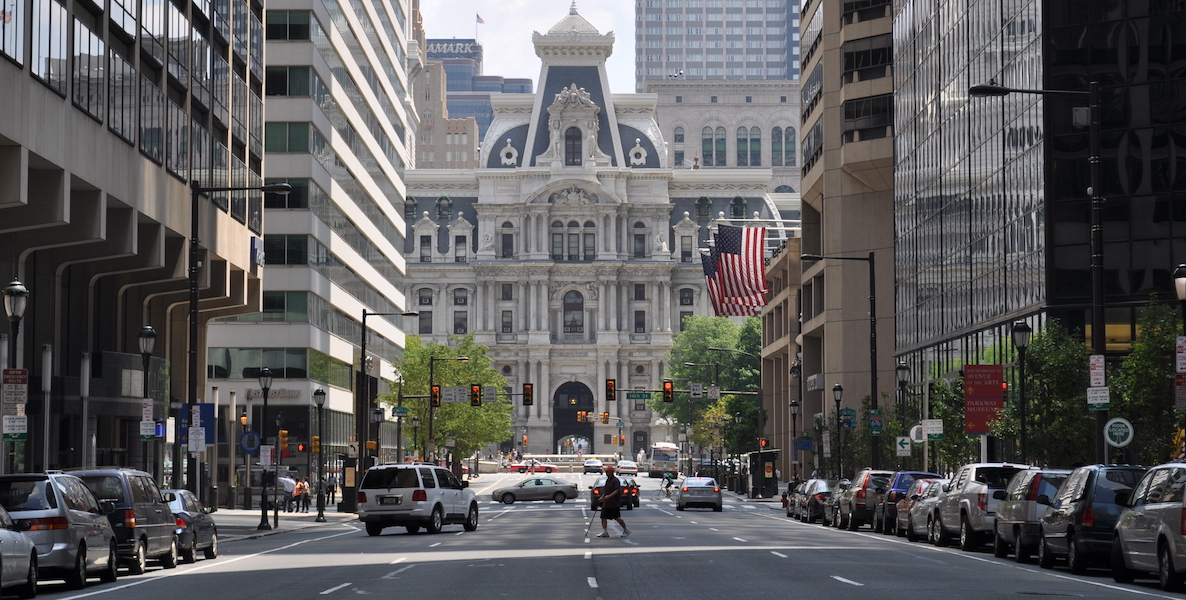If you want some insights into how city government works in Philadelphia, just ask a small business owner.
![]() Take, for example, an entrepreneur in East Oak Lane whose business was recently shut down—erroneously—because someone thought that she was operating a catering business when she was actually just operating an event hall.
Take, for example, an entrepreneur in East Oak Lane whose business was recently shut down—erroneously—because someone thought that she was operating a catering business when she was actually just operating an event hall.
It took a lot longer to get her business back open, she says, because L&I didn’t have the staffing to come and clear it.
That’s the kind of thing that shouldn’t have to happen. “We know that as a city we can do better,” says Yvette Nuñez, vice president of civic affairs at the Chamber of Commerce for Greater Philadelphia.
“We don’t think that this is a business case alone. We think it’s a case for Philadelphia,” says Nuñez. “We should all want to see Philadelphia grow and thrive.”
And it’s that kind of thing the Chamber—whose members include big and small businesses, nonprofits and government institutions that employ 600,000 people in 11 counties in the region—wants to fix, with an eye towards an even greater goal: attracting businesses to the region—and, with them, jobs—by making our city one that’s easy for business owners to navigate, administratively.
After all, jobs, as the Chamber’s Roadmap for Growth has noted, are a vehicle for ending poverty.
To that end, last March the Chamber launched its PHL Neighborhood Growth Project Policy Agenda, which rests on four pillars: inclusive growth and good jobs; education and workforce modernization; safe and healthy neighborhoods; and putting people first in City Hall.
![]() In September, the Chamber held a panel discussion about education and workforce modernization. And on Wednesday, it will convene City Controller Rebecca Rhynhart; Denise Smyler, former PA general counsel; David Thornburgh, president and CEO of the Committee of Seventy; Marc Coleman, president of The Tactile Group; and Alison Perelman, executive director of Philadelphia 3.0, to address that fourth pillar. The panel will be moderated by Citizen co-founder Larry Platt, who will invariably bring The Citizen’s problem-solving lens to the conversation.
In September, the Chamber held a panel discussion about education and workforce modernization. And on Wednesday, it will convene City Controller Rebecca Rhynhart; Denise Smyler, former PA general counsel; David Thornburgh, president and CEO of the Committee of Seventy; Marc Coleman, president of The Tactile Group; and Alison Perelman, executive director of Philadelphia 3.0, to address that fourth pillar. The panel will be moderated by Citizen co-founder Larry Platt, who will invariably bring The Citizen’s problem-solving lens to the conversation.
“The panelists all agree that this is an important discussion to be had and have expertise at various levels of government,” says Núñez. “Rebecca can speak very specifically to her role as controller, and Denise can talk about how she implemented transparency practices at the state level when Governor Wolf took office. Mark has done data-visualization work at the federal level with the U.S. Department of Education. So we really want to set a baseline for the audience of what we mean by transparency, and how [wide-ranging] the issue is.”
Núñez points out that transparency wasn’t always called that—but that the issue ![]() has always been there, and warrants thoughtful attention.
has always been there, and warrants thoughtful attention.
“When we’re in neighborhoods meeting with small businesses and micro-businesses in commercial corridors across the city and they’re talking about how difficult it is to do business in City Hall—to start a business, to go through the permit process, how there’s no real accountability—what they’re talking about is transparency in government,” Núñez says.
The panel’s focus keeps with the spirit of the Chamber’s Roadmap initiative, which was launched five years ago and kicked off the Chamber’s efforts to address the city’s high poverty rate by promoting an economic growth agenda.
Future panels, on February 21 and June 4, will explore those other pillars: safe and healthy neighborhoods and inclusive growth, respectively.
As for who should attend on Wednesday, Núñez says anyone who has a heart for Philadelphia: “We don’t think that this is a business case alone. We think it’s a case for Philadelphia. We should all want to see Philadelphia grow and thrive.”
Wednesday, January 22, 8am–10am, $45, National Constitution Center, 525 Arch Street.
Want some good pre-event reading? Check out these related articles:
- Why an engaged business community is key to economic growth in Philly
- How empowering employees can make cities run better for everyone
- Honeycomb Credit helps small business owners in Philly get crowdsourced loans



